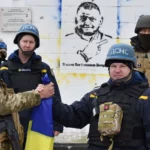Russia is trying to derail negotiations between Serbia and Kosovo, an EU official warned Friday, ahead of talks Brussels hopes will lead to “de facto recognition” between the former foes.
On Monday, EU foreign policy chief Josep Borrell will host Serbia’s President Aleksandar Vucic and Kosovo’s Prime Minister Albin Kurti seeking to help normalise ties.
Both sides, a senior EU official said, have accepted in principle the terms of an unpublished EU plan that would lead to their re-establishing links more than two decades after they at war.
But the success of the plan will depend on the two sides implementing the proposals in the coming months, despite the efforts of Moscow to stir up opposition in Serbia to any deal.
“Russia stepped in and tried to disrupt this work,” a senior EU official said, noting that Russia’s “hyperactive” ambassador to its traditional ally Serbia had given a series of media interviews.
“He is saying that: ‘This is not the right time to address the Kosovo issue and it should wait until the New World Order will be established between Russia and the West’.
“I see this as a threat to President Vucic, warning him not to agree to the proposal,” he said.
“I have not noticed this having an impact on the position of President Vucic, but of course it has had an impact on part of the opposition in Serbia and we saw some violent demonstrations.”
The dispute has rumbled on since ethnic Albanian insurgents in Kosovo and Serbian forces waged war in the late 1990s, triggering a NATO intervention and the withdrawal of Belgrade’s troops and government.
Kosovo’s 2008 unilateral declaration of independence was outright rejected by Belgrade, whose allies China and Russia effectively blocked its accession to the United Nations.
Tensions often flare between the territory’s Serbian minority and ethnic Albanian authorities, such as when Pristina tried to ban Serbian car number plates inside Kosovo.
The EU-led dialogue has been principally backed by France and Germany and has received support from the United States, but it had been a stop-start process.
The text has not been made public, allowing both sides to present an interpretation to their own public.
Meanwhile daily life, travel and business in the region have suffered from administrative logjams.
“You have heard, and some of you have written, that this paper is about de facto recognition, and it is about de facto recognition,” the EU official told reporters.
“There is a lot of substance in this (EU) paper which would greatly relax the atmosphere and remove so many of these obstacles,” he said.
One obstacle, he said, could be Pristina’s reluctance to accept an “Association of Serb-Majority Municipalities” inside Kosovo, fearing it would lead to the creation of a breakaway region.
The official admitted that the slow progress of applications from other western Balkan countries to join the EU had dampened enthusiasm for Europe in the region.
But he said fears triggered by Russia’s invasion of Ukraine should boost support for the Serbia-Kosovo plan and a breakthrough could restart the “locomotive” of European integration.
The talks will begin in Brussels late on Monday.
Source : Barron’s















